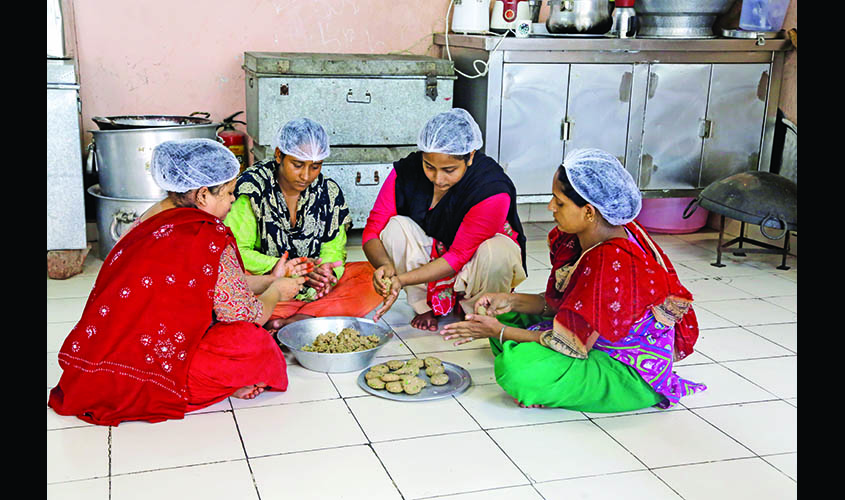The market at Nizamuddin basti is bustling with energy on a Thursday afternoon. There are some people chattering in front of a butchershop and children fighting while playing carom. The smell of fresh biryani fills the air as I walk through the winding lanes towards my destination, a kitchen called Zaika-e-Nizamuddin which is run entirely by a group of local women.
An initiative by the Aga Khan Foundation that began in 2012, Zaika-e-Nizamuddin was set up as part of a dual campaign to create employment opportunities for women and tackle the problem of malnutrition in this area.
Under the Nizamuddin Urban Renewal Inititative, the Aga Khan Trust conducted a survey and found that in this part of the city, over 50% of children under the age of six were malnourished. The surveyors also found that most children here were hooked on junk food and were not getting a balanced diet.
It was with these children in mind that Zaika-e-Nizamuddin was conceived. The programme coordinators enrolled some local women from the basti, who were given basic lessons in cooking. Today, these women are part of a thriving kitchen, which supplies free meals to around 30-35 children every day and caters to commercial buyers as well.

Ratna, who is a programme coordinator, gives me a warm welcome when I reach the kitchen. I see the women chopping vegetables and mixing spices in the verandah.
Currently, there are 11 members of Zaika-e-Nizamuddin. “Earlier, we had to undergo two or three days of training in a week,” says Fatima Khatoon, who was among the first to join this group.
The women started with preparing dry snacks, like ladoos and namkeen, and selling them. It was in 2015 that the idea of a catering wing was introduced to them by the project coordinators. Soon after, the chefs were made to attend training sessions on standardisation of recipes, hygiene and team work. “We used to earn Rs 200 in the beginning but now, each one of us earns around Rs 6000-7,000 a month,” says Noor Jahan, who is the supervisor of the group.
The chefs work on shifts, determined by the number of orders they receive. Noor Jahan takes care of the duty roster and ensures timely delivery of pending orders. In case of a large order, all the cooks turn up for help.
Zaika-e-Nizamuddin now supplies to parties as well as to restaurants. The demand for their food is picking up for obvious reasons: quality of the meals prepared and the uniqueness of the recipes used.
These community chefs have been using the age-old recipes of their grandmothers and mothers, and cooking traditional nizami food. From mutton kebabs to haleem, all the dishes are prepared here in accordance with a culinary tradition that goes to the golden age of Lucknow.
“We go for exposure visits to Lucknow, to learn more about cooking. I learnt to cook galoti kebabs there,” says Noor Jahan.
Recently, the group was invited by the Park Hyatt, Hyderabad for cooking at a food festival. They were given the charge of curating a nizami menu. “We were given a very warm welcome there, the chefs, the team, everybody was so nice,” chuckles Fatima.
Besides the work they have done for several hotels and restaurants, Zaika-e-Nizamuddin’s members have also been invited by the makers of a popular television cooking show.
Today, we can look at the busy kitchen in Nizamuddin and call this project a success. But for the women of Zaika-e-Nizamuddin, this has been a hard-won success. “Back in the day, our family members would try to stop us from coming here. They used to say, ‘Why do you go there just for the sake of Rs 100? Sit back at home and start sewing. It will fetch us more money,’” recalls Fatima.
Over time, the chefs started receiving recognition and acclaim for their work, especially after they began their catering project. Now, not just their families but the community at large approves of what they do. The project proved to be a crucial source of livelihood as well as a source of self-confidence for these women.
“We wanted to sell the food through the Integrated Child Development Services centres, but we did not get permission from the government for that,” says Jyotsna Lall, who is the Director of Programmes at Aga Khan Foundation. “So we still sell through our stalls at various events and festivals and are looking for more ways to sell our products.” Zaika-e-Nizamuddin has surely come a long way and is taking steps towards gaining the recognition it deserves.

